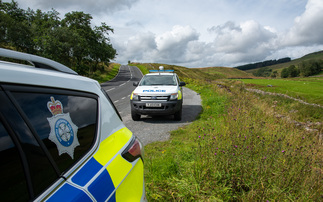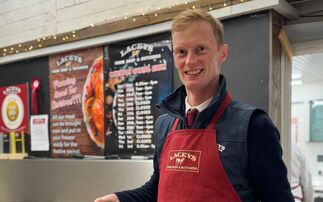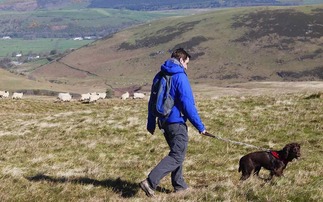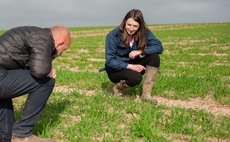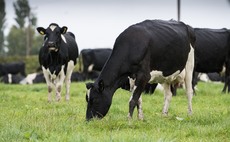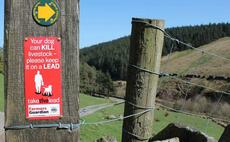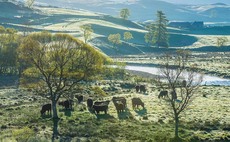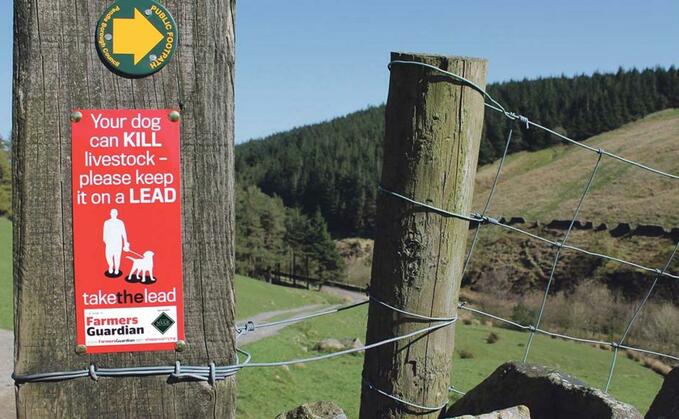
The cost of livestock worrying has increased by 30 per cent, according to the NFU Mutual
A new survey has highlighted a £2.4 million cost to farmers from dog attacks in the UK.
NFU Mutual's survey, which featured 1,116 dog owners, found a 30 per cent rise in livestock attacks by dogs between 2022 and 2023, which had led to either injuries or deaths.
The farm insurer said 'complacency' and an 'inability' from dog owners to control pets had led to the increased figure.
In England, the South West was the worst-hit region by cost, with dog attacks on livestock costing an estimated £359,000, followed by the Midlands (£331,000).
'Heavily' pregnant sheep attacked by dogs in Cheshire
Around 68 per cent of the dog owners surveyed said they were letting their dogs off leads in the countryside in 2023, compared to 64 per cent in 2022.
Less than half, 49 per cent, said their pet always comes back when called.
Almost eight percent admitted their dog chased livestock but 46 per cent believed their dog was not capable of causing the death or injury of farm animals.
More than half, 54 per cent, said they did not need to take active measures to prevent their dog from chasing.
If present at an attack, 57 per cent of dog owners would intervene to stop it, 22 per cent would report it to a local farmer and 11 per cent would call the police.
Hannah Binns, NFU Mutual's rural affairs specialist, said: "The shocking increase in the cost of dog attacks on livestock is incredibly alarming news for farmers, especially as the 2024 lambing season gets underway and pregnant ewes and newborn lambs are vulnerable.
"We have heard reports from farmers about dog owners who regularly allow their pets to roam off-lead in the countryside, seemingly unaware of the carnage the dog could cause, who are then horrified when an attack happens.
"Complacency kills, though, and there have been incidences where dogs have chased, injured and killed sheep and the owner is powerless to stop it or nowhere to be seen.
"All dogs are capable of chasing, attacking and killing farm animals, regardless of breed, size or temperament.
"Farmers are living in fear of repeat attacks, which cause horrific and needless suffering to livestock and can traumatise all involved dealing with the aftermath.
"We are urging all dog owners to be responsible for their pet and keep them on a lead when walked anywhere near livestock.
"If there is an attack, it is important people accept responsibility and report it, to a local farmer and the police, so that the injured animals are not left suffering in pain."
NFU livestock board chair Richard Findlay said: "NFU Mutual's new figures on livestock worrying are shocking to see.
"Livestock worrying and dog attacks cause great stress and aguish for farmers seeing their animals suffering, in addition to the significant financial impact they also feel.
"For many years we have been working with government and police leaders to strengthen the legislation to tackle livestock worrying.
"We warmly welcome the introduction of Thérèse Coffey's Dogs (Protection of Livestock) (Amendment) Bill which, if passed, will improve police powers to investigate dog attacks on livestock.
"We want people to enjoy the countryside and welcome members of the public being able to see where their food is produced, but dog owners must do this responsibly.
"No matter how in control dog owners think they are, they should always remain alert and dogs should always be on a lead around livestock, especially as we approach the 2024 lambing season.
"If anyone sees an incident where they believe a livestock worrying incident has taken place, I encourage them to report it to the farmer and police."
Wales
Dog attacks on Welsh livestock cost an estimated £883,000 last year, more than double the 2022 cost (£439,000), latest figures from NFU Mutual reveal.
Alun James, a fourth generation farmer near Llangadog in Dyfed, said 80 sheep had been killed in two livestock worrying incidents during 2023.
Mr James has been a farmer all his life and keeps 1,500 Welsh Talybont ewes on his 300 acre farm.
He said the 80 sheep had been killed by a sole Siberian husky from a nearby property.
The first attack was witnessed by Mr James' mother.
Ewe euthanized after 'horrific' dog attack in Wales
She managed to drive the dog off but it left a 'trail of carnage' behind with ewes and lambs dead in the field.
Some of the surviving sheeps' jaws were so badly injured that they could not eat, and they had to be put down, Ms James added.
Other sheep and lambs had been driven into the nearby river where some drowned.
Altogether, 36 sheep were killed in the first attack.
Six weeks later, another attack took place in the same 45 acre grazing ground.
Fifty sheep had been killed or swept away in the river despite Mr James' efforts to save them from drowning.
"The attacks were horrific and left us shaken to the core," Mr James added.
"My mother saw the dog attacking our sheep and breaking their necks by tossing them into the air.
"As well as causing horrific suffering, it has left us in a state of shock.
"We are in a remote area and have not had dog attacks for a long time - the last I can remember was over 40 years ago.
"Our local NFU Mutual agent sorted out the claims for the lost sheep and vet bills but it is still one of the worst things to have hit the farm in my lifetime."
Owen Suckley, NFU Mutual Wales Manager, said the 'shocking increase' in the Welsh cost of dog attacks on livestock had been incredibly alarming news for farmers - especially as the 2024 lambing season gets underway and pregnant ewes and newborn lambs are vulnerable.
"We have heard reports from farmers about the complacency and naivety of some dog owners who regularly allow their pets to roam off-lead in the countryside, seemingly unaware of the carnage the dog could cause, then are horrified when an attack happens," he added.
"There have also been incidences where dogs have chased, injured and killed sheep and the owner is nowhere to be seen.
"Farmers are also living in fear of repeat attacks, which cause horrific and needless suffering to livestock and can traumatise all involved dealing with the aftermath.
"All dogs are capable of chasing, attacking and killing farm animals, regardless of breed, size or temperament.
"We are urging all dog owners to be responsible for their pet and keep them on a lead when walked anywhere near livestock.
"If there is an attack, it is important people accept responsibility and report it, to a local farmer and the police, so that the injured animals are not left suffering in pain."
Rob Taylor, Wales Rural and Wildlife Police Crime Coordinator and NPCC Livestock lead, added: "Ever since I started the first dedicated police rural crime team in North Wales in 2013, we have witnessed on a daily basis the devastating impact of livestock attacks by dogs and the effect of irresponsible dog ownership on our rural communities.
"Campaigns and awareness have a limited effect, as some dog owners just simply don't heed our warnings and the attacks continue, as evidenced by the recent statistics from NFU Mutual.
"Over several years we have been engaged and worked with the UK government and Defra to seek a new and effective up to date law, to aid police investigations, protect farmers, livestock and ultimately bring those irresponsible dog owners to justice.
"We are hopeful that a recent private members bill will be successful this year and that we can make a big step forward in utilising this new law and reducing the impact that livestock worrying has on our farming communities here in Wales."
Scotland
Dog attacks on Scottish livestock cost an estimated £123,000 last year, more than double the 2022 cost, latest figures from NFU Mutual reveal.
NFU Scotland policy advisor for rural business, Rhianna Montgomery, said: "We are disappointed to see that the impact and cost of livestock worrying on Scottish farmers and crofters has increased significantly, suggesting a surge in instances of worrying and attacks by dogs.
"We need to understand the reasoning behind this increase in irresponsible dog ownership and ensure that we are doing everything we can to promote the message to the public.
"Dog owners need to be aware of the pain and suffering their pet has the potential to inflict when they attack livestock, as well as being aware of the repercussions.
"We continue to encourage farmers to report all incidents of livestock being attacked by dogs to ensure that our hard-won changes to legislation hold all irresponsible dog owners to account."
Inspector Jordan Low of Police Scotland added: "Protecting livestock is an important issue and a priority for the Scottish Partnership Against Rural Crime (SPARC) membership.
"Livestock worrying and attacks can result in injury, miscarriage and even death.
"The damage and distress caused not just to the animals, but the farming business is considerable.
"It is also a crime.
Five sheep drown after dog attack in Lincolnshire
"It is the dog owner's responsibility to ensure their dog is on a lead and under control when livestock is present.
"Failure to do so can result in a fine up to £40,000 or a 12-month prison sentence.
"Police Scotland through SPARC is committed to working with its partners to increase public awareness of the legislation to protect livestock from dog attacks and irresponsible dog owners will be prosecuted."
Banffshire farmer Pauline Mitchell said she still has to contend with the consequences of sheep being injured and killed by out-of-control dogs despite installing hundreds of metres of double fences to protect her livestock.
Part of a family who have farmed in the Scottish Highlands for generations, Ms Mitchell farms in partnership with her father, Charles Irvine.
They currently 400 Texel X ewes and a 100 suckler cows on a holding of 1,400 acres - including 700 acres of upland grazing.
One incident included an in-lamb Texel X ewe which had been found dead by a field gate with injuries to its throat.
"All the sheep were crowded in a huddle in a corner of the field, so it was obvious they had been chased by a dog," Ms Mitchell said.
"It is a continual problem.
"We are in a spot which is very popular with walkers, and many let their dogs roam free despite us having livestock in the fields.
"We have put in double fencing and grown thick hedges to separate our livestock from walkers and we have put in hard-core trails in the most popular locations.
"However, people still encourage their dogs to get into the fields to run round while they walk on the fenced paths. It's very frustrating.
"They cannot seem to grasp that all dogs have an instinct to attack grazing animals and even chasing them can cause serious injuries."
Scottish Conservative Shadow Rural Affairs Secretary Rachael Hamilton said NFU Mutual's figures were 'deeply alarming'.
"My thoughts are with any farmer who has suffered the devastation of their livestock being injured or killed," she added.
"As we approach lambing season, it is vital that we all use our countryside responsibly and remember that it is a working environment.
"That means keeping dogs on leads at all times, following Scotland's outdoor access code and avoiding fields with livestock which can all help to avoid situations where animals are injured or killed from happening.
"The economic and welfare costs of such incidents are significant and it is worrying in particular to see more people let their dogs off their leads in the countryside.
"The onus is on us all - including SNP ministers - to promote responsible use of the countryside and also ensure resources are in place to properly punish those who fail to protect animals."
Northern Ireland
Dog attacks on livestock in Northern Ireland doubled in 2023, compared to 2022 and 2021, latest figures from NFU Mutual revealed.
Farm animals worth an estimated £147,000 were severely injured or killed by dogs in 2023 alone.
Co Armagh farmer George Carvill said he had considering giving up his sheep flock after a dog attack left 28 lambs dead.
Mr Carvill's family has run a 90-acre farm on the outskirts of Middletown for over 50 years, which also finishes beef cattle.
No-one witnessed the attack, which took place in early December 2023 and Mr Carvill added he had been deeply concerned that the dog or dogs responsible could return and cause 'carnage' to his in-lamb ewes.
"It was a terrible experience for me and my 16-year-old son, Frank, who looks after the sheep with me," he said.
"We walked into the field to feed the lambs sugar beet and were shocked to see a dead lamb near the gateway.
"We thought it was a one-off, but as we walked through the field we saw another dead lamb, and then more and more - 28 in all.
"They had been badly mauled, and it was clear the injuries were the result of a dog attack."
Mr Carvill and his son Frank had reached the field boundary to find that another 12 lambs had been stampeded into the River Cor where they had drowned.
Only 13 lambs were left alive - some with injuries to their face - by jumping into the next field.
"I just do not know what we are going to do - because no-one saw the dog," Mr Carvill added.
"We have no way of tracing it and there is a very real risk it will come back and attack again if we bring the ewes back to the f.
"We have not had a dog attack since 1983 - but there are a lot more dogs around now in Middletown and we know some of them are let out to roam uncontrolled by their owners."
Greg and Glen Longstaff said they have run the 40 acre farm between Ballymena and Ballyclare for five years with a flock of pedigree Texel and Dorset ewes.
However, two dog attacks on their small flock have left Northern Ireland farmers Greg and Glen with two ewes dead and a disrupted breeding programme last Autumn.
The attacks came just a few days after the 70 ewes had been artificially inseminated.
The dogs responsible for the attacks have not been traced, leaving Greg with the worry his flock could suffer further attacks.
From a sighting of the dogs and the vet's report on the dead ewes' injuries, Greg said the attacks were carried out by a husky-type dog and terrier.
"It is the first dog attack we have had and we're at a loss to understand where the dog came from," Greg said.
"We are in the middle of nowhere, with no footpaths and we're not even near a road.
"There were 18 ewes in the field at the time of the attack, and two pedigree ewes were killed.
"Six were left empty with the loss of semen which can't be replaced, altering our breeding plans.
"Even after intervention from the dog warden he dogs weren't traced - but would have been covered in blood after eating the throat out of an ewe.
"Although our NFU Mutual insurance covered the value of the sheep that were killed, the attacks cased a tremendous amount of disruption and the loss of lambs is going to hit us hard.
"We run the flock for the joy of keeping sheep rather than as a purely commercial business, and this has taken the pleasure out of it.
"We are now checking the sheep more often and regularly making sure the fences are all in good order - but it is practically impossible to fence the fields to make them completely secure against determined dogs.
"We have also put cameras round the farm to help trace dogs if there's another attack."
Dungannon farmer David Scott, who has farmed all his life on 40 acres of land, said repeated dog attacks - which resulted in the deaths of 54 lambs - had made him stop him reconsider keeping sheep.
Mr Scott said the first attack took place in December 2021 when a large dog killed 18 lambs.
A further 15 drowned after being chased into the river and the attack only stopped when the Dungannon farmer shot and killed the dog.
In December 2022, Mr Scott said another dog carried out a 'frenzied attack' on his Beltex-cross lambs which killed 12 of the 120 head flock.
Despite an insurance pay out from his NFU Mutual policy, the Dungannon farmer has stopped buying in lambs to finish through the Autumn because of the risk of further attacks.
"Around here the villages are being developed and there are more people and dogs than ever before - and some are keeping large dangerous dogs," he added.
"I hope to go back to finishing lambs in the future - but at the moment, it is too risky."
Mr Scott's farm is a mile from the nearest village, but large dogs left free to roam have been seen frequently by neighbouring farmers.
"The injuries caused by the dog in the latest attack were absolutely horrific," he said.
"The vet who came out to euthanise the badly-injured lambs said the bite marks were so large it looked like a wolf attack."
Ulster Farmers' Union deputy president William Irvine said: "On the mouth of lambing 2024, it is horrifying to see that dog attacks in Northern Ireland doubled last year.
"Behind every statistic is a farm family that has experienced immense trauma and financial loss due to an attack on their livestock that could have been prevented.
"It is extremely worrying that 68 per cent of dog owners let their pet roam free in the countryside.
"Every dog, regardless of the breed or temperament, is a threat to sheep and their owners must recognise this.
"It only takes a spilt second for a dog to instinctively react to sheep and begin a chase.
"We are urging dog owners to be responsible in the countryside by keeping their dog on a lead and under control at all times.
"This is so important not only for livestock, but for the safety of their pet too.
"By being mindful of farm animals in the countryside, we can stop livestock worrying, enabling dog owners to enjoy their walks peacefully and livestock can reside without threat, reducing daily stress for farmers."
Advice
With many dog owners planning to visit the countryside at a time when sheep and lambs are at their most vulnerable, NFU Mutual is calling for them to:
- Keep dogs on a lead when walking in rural areas where livestock are kept but let go of the lead if chased by cattle
- Be aware that all dogs, regardless of size, breed, and temperament, can cause the distress, injury and death of farm animals
- Report attacks by dogs to the police or local farmers
- Never let dogs loose unsupervised in gardens near livestock fields - many attacks are caused by dogs which escape and attack sheep grazing nearby
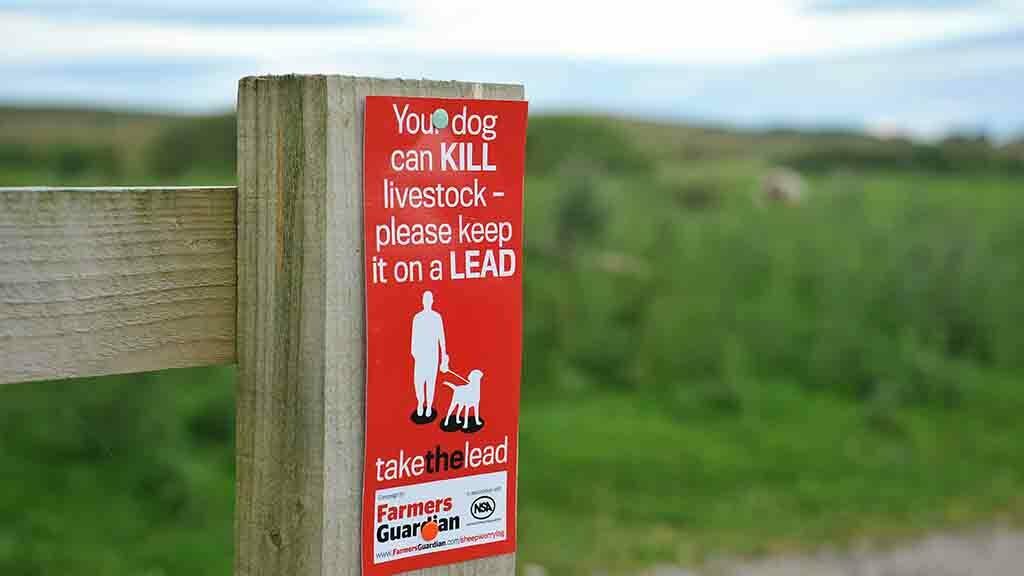
Free signs warning dog owners to keep their dogs on a lead near livestock are available through Farmers Guardian's Take the Lead campaign, in association with the National Sheep Association.
To request yours, send a stamped self-addressed A4 envelope to: FG Take the Lead, Farmers Guardian, Unit 4, Fulwood Business Park, Preston, Lancashire, PR2 9NZ.
We will be able to send up to 25 signs.













